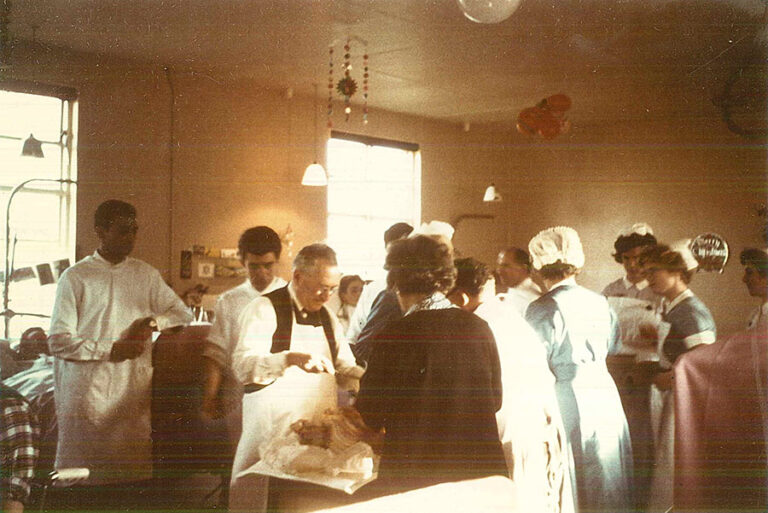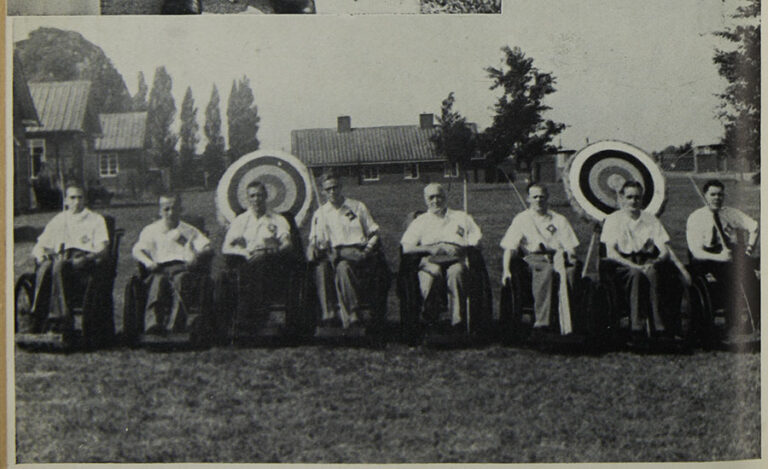The Paralympics are here! Once again we get to watch extraordinary feats on the field and triumphs on the track. But what are the origins of the games? Many people are aware of the historic foundation of the Olympics, but fewer realise the fascinating development of the Paralympics, rooted in the brutal realities of post-war Britain.
The National Archives holds clues as to these origins, pointing us to Stoke Mandeville Hospital in Buckinghamshire and its rivalry with the Star and Garter Home in Richmond. However, following the research trail through our online catalogue, Discovery, takes us to Buckinghamshire Archives and the fantastic resource they have helped to build to allow people to dig in to the history preserved in archives.
Katherine Gwyn, Community Outreach and Projects Archivist from Buckinghamshire Archives, tells us more:
Until the middle of the 20th century experiencing an injury to your spine was usually a slow and painful death sentence: not from these injuries, but from bed sores. The wisdom that prevailed into the 1940s was to keep spinal patients as still and immobile as possible. The increase of spinal patients injured in the Second World War saw wards full of men and women lying still all day and all night, with infected bed sores making them ever more poorly.
This was to change though. Dr Ludwig Guttmann was a German neurologist who fled to Britain in 1939. He was Jewish, and at that time Nazi persecution was rampant and put his life at risk.
Aware of his work with paraplegic patients in Poland and Germany before the war, the British Government and the RAF asked Guttmann to set up a specialist unit to treat airmen with spinal injuries. Space was found at Stoke Mandeville Hospital, near Aylesbury, Buckinghamshire, and the unit was opened in 1944, staffed by Guttmann himself, two nurses and eight orderlies.

Guttmann believed that physical movement was the key to rehabilitation; he put this into practice at Stoke Mandeville. Patients were encouraged to participate in occupational therapies, including manual crafts, and of course, sport. This was good for the body: the veterans could build up muscle strength. And it was good for the mind: patients could grow their confidence. Archery, table tennis and wheelchair basketball were sports that you would be likely to see patients playing if you visited the Spinal Unit, even in its earliest years.
The natural progression of using sports as therapy was to hold competitions. In 1948 Guttmann organised the first Stoke Mandeville games, where his patients competed with veterans from the Star and Garter home for ex-servicemen in Richmond, at archery. This competition grew over the years, becoming international and including more sports. Guttmann was still heavily involved when the name ‘Paralympic Games’ was first used in Rome in 1960.

In the run-up to the 2012 games in London, staff from Buckinghamshire Archives started working with the National Spinal Injuries Unit at Stoke Mandeville Hospital, and connected parasport organisations – Wheelpower: British Wheelchair Sport, and the International Wheelchair and Amputee Sports Association – to review their archives, and capture the stories of Guttmann and his patients. Out of this work the Mandeville Legacy website was created – it’s a great place to delve more deeply into this rich heritage: http://www.mandevillelegacy.org.uk/.
At this time the National Paralympic Heritage Trust was founded. The Trust has taken the lead in collecting and preserving the internationally significant history for the Games. Take a look at its website: https://www.paralympicheritage.org.uk/.
Buckinghamshire Archives takes an active role in collecting, preserving and making accessible archive collections of disability sport and the Paralympic Games. If you want to hear more about these histories, Buckinghamshire Archives has produced two podcasts:
Buckinghamshire Archives is currently recruiting volunteers to help improve access to these collections. If you are in the area and want to get involved with box listing, drop us an email archives@buckinghamshire.gov.uk.
You can read more about Sir Ludwig Guttmann and the birth of the Paralympic Games in our Explore the Collection section.
It is such a shame though that Kennedy-Shriver’s name is more closely associated with these games than is Guttman’s and as a result, the US gets way too much credit for the wonderful beginnings of the Paralympics.
I was a nurse at Stoke Mandeville in 1952, can remember the patients practising archery – and going to the nearby pub in the evening!
Beryl Bauld (yes I am ancient!
A really interesting article, I wasn’t aware of the background to the paralympics, but I am now. Thank you for writing this.
It has been good researching about this for my homework it has learnt me a lot while researching
Thanks